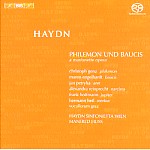Philemon and Baucis is a strange and remarkable work. Originally composed in 1773, it is the only survivor that we know of among Haydn’s scant half-dozen or so marionette operas. The story is quite serious, and these puppets were life-size, not the cute little things that kids play with. Disgusted with the depravity of mankind, Jupiter decides to exterminate the species, but comes down to Earth with Mercury during a storm for one last look. There they meet an elderly couple, Philemon and his wife Baucis, whose only son and his fiancée were killed by a lightning bolt on their wedding day. Their ashes are kept in a pair of urns. Moved by the tale, as well as by the couple’s unique hospitality and kindness, Jupiter decides to spare mankind and restores the youngsters to life.
Not all of the work survives. The prelude on Mt. Olympus is largely lost, save for its overture and a bit of incidental music. Originally the piece concluded with the usual aristocratic homage, in this case to the Empress Maria Theresa, but this too is missing (no loss there, probably). All told, there’s only about 40 minutes of music, plus a lot of dialog (skillfully edited down for this recording). Even with a few extra interludes added, as here, the entire work lasts less than an hour. The music, though, is extraordinary.
The first movement of the overture, Allegro con espressione, says it all. This is exceptionally moving stuff, full of Sturm und Drang, with Haydn taking pains to give his marionettes music of substantial humanity and warmth. There’s a terrific opening storm chorus and a selection of brief arias of really striking beauty, particularly the son Aret’s “return to life” number, “Wenn am weiten Firmamente”, with its pathetic solo oboe and pizzicato strings.
Happily, the cast here is very strong (as it was not in Manfred Huss’ recording of Acide in this series). The music is not unusually taxing to sing, and Huss has found firm, pleasant voices all around–there are no weak links at all. The scoring–flutes, oboes, bassoons, horns, timpani, and strings–is quite colorful too, and the Haydn Sinfonietta Wien makes the most of it. Although necessarily for Haydn specialists, the music here really is special. Even though I’m no fan of spoken dialog (in German or any other language), this vividly recorded release gives the fullest picture of this genuinely moving work. [11/10/2009]
































